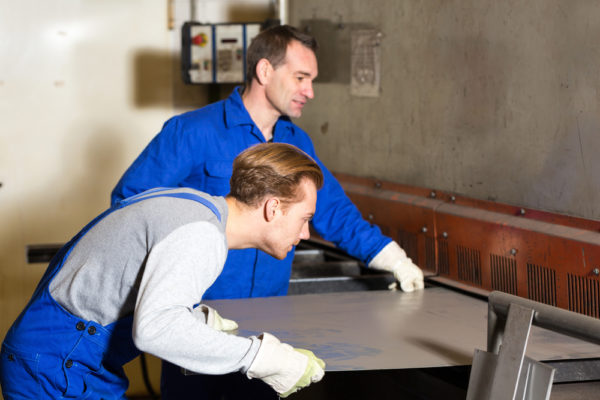Sheet metal is a piece of metal that can come in varying thickness’ and cover a wide range of metals such as titanium, aluminium and steel. Sheet metal is used with industrial machinery and has many other practical applications. It is used on the wings of aeroplanes, car bodies and also as a material for roofs. Sheet metal actually has a pretty interesting history though. So, here are 6 things you probably didn’t know about sheet metal.

1. No matter the type of metal, the construction process is the same
Sheet metal can be made from:
- Aluminium
- Steel
- Copper
- Brass
- Nickel
- Tin
- Copper
- Sterling Silver
- Titanium
The process for creating sheets from all of these types of metals is the same. The metal is first melted and then poured into a mould where it can cool and take the shape of an ingot. It is important for the metal to be kept hot as it is being poured so it doesn’t cool outside of the mould.
Once it has cooled, it is dipped into some chemicals which clean the metal – a process known as pickling. It is then rolled repeatedly by a large press. The press will then heat up the metal in what is called the annealing process, whilst still rolling over it. Once the desired thickness is reached the sheet is ready to be shipped out.
2. They come in varying thickness’
Whilst this may seem like an obvious one, there are certain parameters that sheet metal thickness follows for it to be useable. These are identified as gauges, and each sheet metal size has a different gauge. The gauge number doesn’t have any relation to the actual size of the thickness but is simply an industry standard for identifying them.
There are different gauges depending on the types of metals being used. For example, a 10 gauge of steel sheet metal is different from a 10 gauge of aluminium sheet metal. This is due to the fact that the gauges, whilst they identify the thickness of the sheet – the higher the gauge the thinner the sheet – they’re determined based on their weight. So, an aluminium sheet may be the same thickness as a steel sheet, but they would weigh differently.
3. Sheet metal is not a modern marvel
Whilst it may seem like something that is only a few hundred years old, the reality is that sheet metal has been manipulated by sheet metal machinery for thousands of years. In fact, the earliest known use of sheet metal is from around 4,000 B.C when people would use large stones to roll the metal into their desired shape. The ancient Egyptians used sheets of gold and silver to craft magnificent jewellery for themselves.
A historic and iconic use of sheet metal is the construction of armour and weapons. It wasn’t until the 1400s where Leonardo Da Vinci designed a device capable of rolling sheet metal that the industry took a huge leap. This device was not properly completed until 1590 however, after Da Vinci’s death.
4. Decorative sheet metal exists
Whilst you can find the most common type of sheet metal to work with listed above, there are also decorative, softer materials such as gold, platinum and silver that can be made into sheet metal. For obvious reasons these are not very common and are not generally not used in the same industries the more run-of-the-mill metals are used in. These are instead used for adornment purposes and cost quite a bit more.
5. Sheet metal is responsible for other industry inventions
It’s true! Sheet metal machinery such as press brakes and hydraulic press’ were created for the express reason of being used with sheet metal. Whilst a press brake is used to bend sheet metal, a hydraulic press applies pressure to sheet metal in order to compress it. The first press brake was created around the mid-1600s, whilst the hydraulic press first came into existence in 1770 thanks to Industrialist Joseph Bramah.
6. Sheet metal is in its own category
Sheet metal is actually classed as a medium thickness metal, typically ranging from .2mm to 6mm in thickness. Foil – or leaf – metal is the thinner sheet, which is anything under .2mm. The thickest of the three is plate metals and are predominantly 6mm or thicker.
Looking for sheet metal machinery?
ACRA Machinery is the only place you’ll need to find both new and used sheet metal machinery. Whatever your needs are, we offer a range of services and products to satisfy all your sheet metal machinery needs.
If you’d like to know more about our quality sheet metal machinery, then please give us a call on 03 9794 6675 or send us a message through our website.
